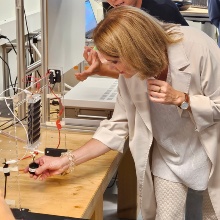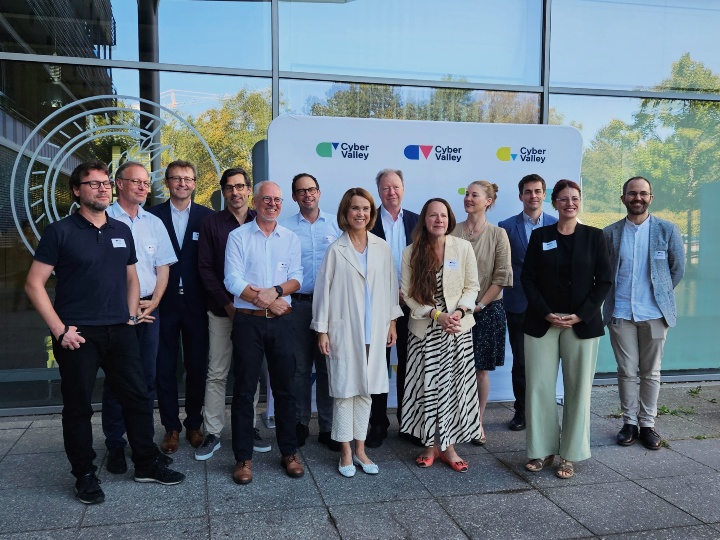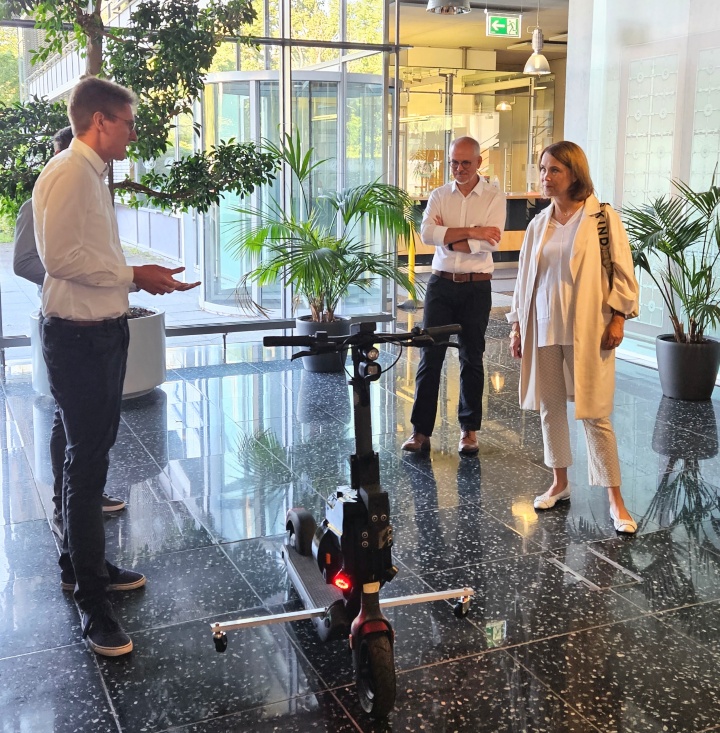With technologies of the future, such as intelligent robotics, generative and logical artificial intelligence (AI), medical robots, and sensor technology for the field of oncology, the University of Stuttgart showed Minister of Science Petra Olschowski how fundamental AI research is being integrated into cyber-physical systems at Stuttgart's "Cyber Valley".
The University of Stuttgart appeared twice on the agenda of Petra Olschowski's week-long "Summer Tour on the Topics of the Future: Digitalization and AI". On September 8, 2023, the Minister of Science for Baden-Württemberg and University of Stuttgart alumna, discovered first-hand how student teachers are gaining experience in digital teaching at the Makerspace on Campus Vaihingen. In this accessible space, members of the University of Stuttgart are welcome to use the 3D printers, laser cutters, embroidery machines and various other digital tools to let their creativity flow, and to forge new contacts. On September 11, 2023, she visited Cyber Valley in Stuttgart.
Impressive projects at Cyber Valley in Stuttgart
At the Max Planck Institute for Intelligent Systems (MPI IS) in Stuttgart, Olschowski learned more about AI research currently being conducted at the University of Stuttgart as part of the Cyber Valley project. Cyber Valley, Europe's largest AI research consortium, presented selected projects involving top scientists from the University of Stuttgart.
Rebecca Reisch, Director of the Cyber Valley GmbH, Rector Professor Wolfram Ressel and Professor Christoph Keplinger (MPI IS and the University of Stuttgart) emphasized in their joint welcome speech just how important AI has become as a key future technology. They highlighted that the University of Stuttgart, which is a founding member of Cyber Valley, together with the University of Tübingen, MPI IS and other partners, has made a long-term commitment to the topic of intelligent systems and has integrated this into both its vision of "Intelligent Systems for a Sustainable Society" and many of its study programs. The core strength of Cyber Valley in Stuttgart lies in the transfer of fundamental AI research to cyber-physical systems and socially relevant applications. It was also emphasized that the impact of such technologies on society is always taken into consideration at Cyber Valley in Stuttgart.
Intelligent robotics and bionic intelligence
Professor Frank Allgöwer used the example of an autonomous electric scooter to demonstrate how intelligent robotics can contribute to sustainable mobility - first on campus as a test, and then in more complex environments, such as entire cities. Professor Syn Schmitt explained how medical robots could reduce suffering in the future through individual patient-specific support and enable social participation even in old age. Together with Professor Christoph Keplinger, he is working on novel muscle robots that will be able to offer patients individualized help with everyday movements in the future. This project is a collaboration between the two universities of Stuttgart and Tübingen, and the MPI IS and thus a prime example of the team spirit that characterizes Cyber Valley.
Professor Katherine Kuchenbecker and Professor Metin Sitti delivered an impressive tour of their laboratories, demonstrating the important contributions being made in Stuttgart to international research in the field of haptic intelligence. All three Max Planck researchers, Keplinger, Kuchenbecker and Sitti, also hold professorships at the University of Stuttgart.
Insights into the new Institute for AI and the Research Training Group
Professor Steffen Staab presented the research he is conducting together with Professor Kai Arras and three other professors at the recently founded Institute for Artificial Intelligence at the University of Stuttgart. This focuses on AI for Simulations and Intelligent Robotics. The AI-based linking of facts and expertise plays an important role in his research. One possible application scenario for the technologies being developed might be, for example, the AI-supported analysis of patient data. Professor Oliver Sawodny also provided exciting insights into current research projects, when he reported on what early career researchers at the Research Training Group "Intraoperative Multisensory Tissue Differentiation in Oncology" are researching: They are using machine learning methods to combine various types of new sensor technology intended to aid doctors during cancer operations in deciding whether to preserve or remove individual tissue.
Olschowski: The future is being made here
Minister of Science Olschowski was impressed by the way in which future technologies are being developed and integrated into research and teaching in Stuttgart and how these are being transferred directly into applications. She also highlighted how essential this is for attracting future students. She said: "The future is made in Cyber Valley with the artificial intelligence of tomorrow. The possibilities that AI opens for us in medicine, for example, are very impressive: from intelligent robots with a sense of touch to AI-assisted operations. We must take advantage of these opportunities for the benefit of our health, our quality of life and our well-being. That's exactly why we created Cyber Valley together with partners from science and industry. Visits like this one today reinforce for me again and again how important our commitment to innovation is and the benefits it can provide."
Professor Wolfram Ressel, Rector at the University of Stuttgart, emphasized that the extraordinary commitment shown by all the universities, research institutions, and partners involved, has made Cyber Valley an exceptional innovation network in the shortest amount of time. Long-standing and beneficial cooperations with the University of Tübingen and the MPI IS, for example, show how important societal progress can be achieved by combining expertise in life sciences and engineering in research and teaching.
The two visits on Olschowski's 2023 summer tour were not her first official appointments at the University of Stuttgart. On her inaugural visit as Minister of Science in November 2022, she visited the High-Performance Computing Center and ARENA2036. And in February 2023, Olschowski and Minister President Winfried Kretschmann were presented selected highlights from quantum research and aerospace engineering by scientists, students and start-ups. She was also present for the launch of the state strategies QuantumBW and THE Aerospace LÄND at the University of Stuttgart. At each visit, she was impressed not only by the research, but also by the spirit of commitment shown by students and teachers at the University of Stuttgart.




